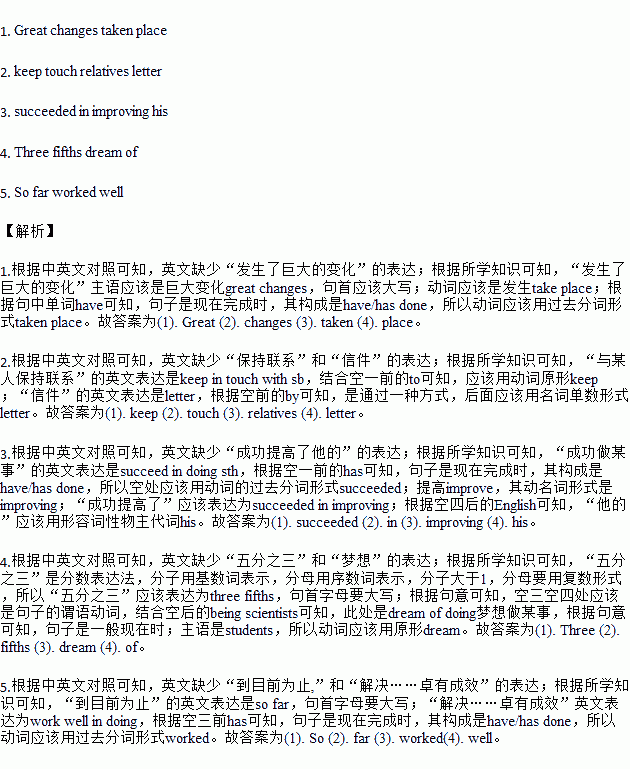ĚâÄżÄÚČÝ
Îĺ.¸ůľÝşşÓďÍęłÉľä×ÓˇŁ
1.ÎŇĂǵļŇĎç·˘ÉúÁ˾޴óµÄ±ä»ŻˇŁ
_____ _______ have______ _______ in our hometown.
2.ŇÔÇ°ČËĂÇłŁłŁĐĹĽţşÍÇ×ÓѱŁłÖÁŞĎµˇŁ
People used to_____in ______ with friends and _____by_____.
3.ŔîĂ÷ÔÚĘîĽŮŔďłÉą¦Ěá¸ßÁËËűµÄÓ˘Ó
Li Ming has______ ______ _______ ______English during the summer holidays.
4.ÎŇĂÇ°ŕÎĺ·ÖÖ®ČýµÄͬѧĂÎĎëµ±żĆѧĽŇˇŁ
_____ _______of the students in our class_____ _______being scientists
5.µ˝ÄżÇ°ÎŞÖą,ÎŇĂÇŐţ¸®ÔÚ˝âľöŐâĐ©Éç»áÎĘĚâÉĎ׿ÓĐłÉЧˇŁ
_____ _______,our government has_____ _______ in dealing with these social problems.
Miss Yang is________kind lady________her friends all like her.
A.so; that B.such; that C.such a; that
Cliffs of Moher are the top tourist attraction in Ireland.They are 214 meters high at their highest point and stretch(ĂŕŃÓ)8km along the coast. To stay on top of the rocks is a quite a frightening but exciting experience. Address: Street R 478, County Clare Hours: Monday-Saturday: 9:00 am-7:00 pm; Sunday: 11:00 am-5:00 pm; Closed on Christmas Day Price: Adults: £10; Children under 10: £4 Website: www.cliffsofmoher.ie |
Dublin Castle is in the heart of old town. It contains the Chester Beatty Library, which is both a library and an art museum that are worth visiting. Address: Dame Street, Dublin City Hours: Monday-Saturday: 9:45 am-4:45 pm; Sunday: 11:00 am-4:45 pm; Closed on Christmas Day Price: Adults: £4.5; Children under 12: £2 Website: www.dublincastle.ie |
1.If Mrs. Smith wants to go to an art museum ,which website can she visit for more information?
A.www.cliffsofmoher.ie B.www.phoenixpark.ie
C.www.fotawildlife.ie D.www.dublincastle.ie
2.If David takes his 9-year-old son to Cliffs of Moher, they will pay________.
A.£6.5 B.ˇę12 C.ˇę14 D.£ 20



